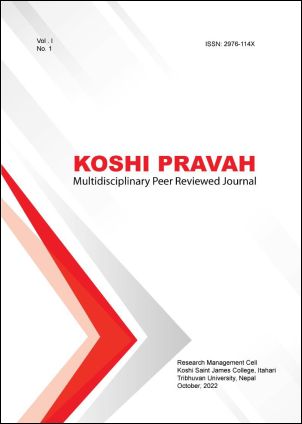Expressive Aphasia and Functional Amnesia in Manto’s “Toba Tek Singh”
DOI:
https://doi.org/10.3126/koshipravah.v1i1.57371Keywords:
expressive aphasia, functional amnesia, partition, psyche, traumaAbstract
This article, based on Saadat Hassan Manto’s short story “Toba Tek Singh”, attempts to explore the effect of the decision of diplomatically agreed exchange of lunatics of Lahore asylum from the perspective of war, violence and trauma. The decision was made between the two newly formed nations, India and Pakistan, just after some time of their partition in 1947. The madmen were forcibly brought to the border on the trucks and they were to be exchanged on the basis of their religious faith. The Hindus and the Sikhs were going to be deported to India and the Muslims to Pakistan. This paper investigates how violence, beyond physical injury, hurts one’s psyche pushing the victim to a loss of language and memory. It uses the theory of violence and trauma to study the effect of partition. Reflecting on the meaning disorder, it analyzes the traumatic shock that is conveyed through blurry words that sound insensible according to the rule of semantics. Revisiting the common notions of lunacy, it examines how expressive aphasia and functional amnesia impair the major character of the story. Its finding suggests that the trauma and psychological breakdown caused due to partition violence can lead one to a state of expressive aphasia and functional amnesia.




